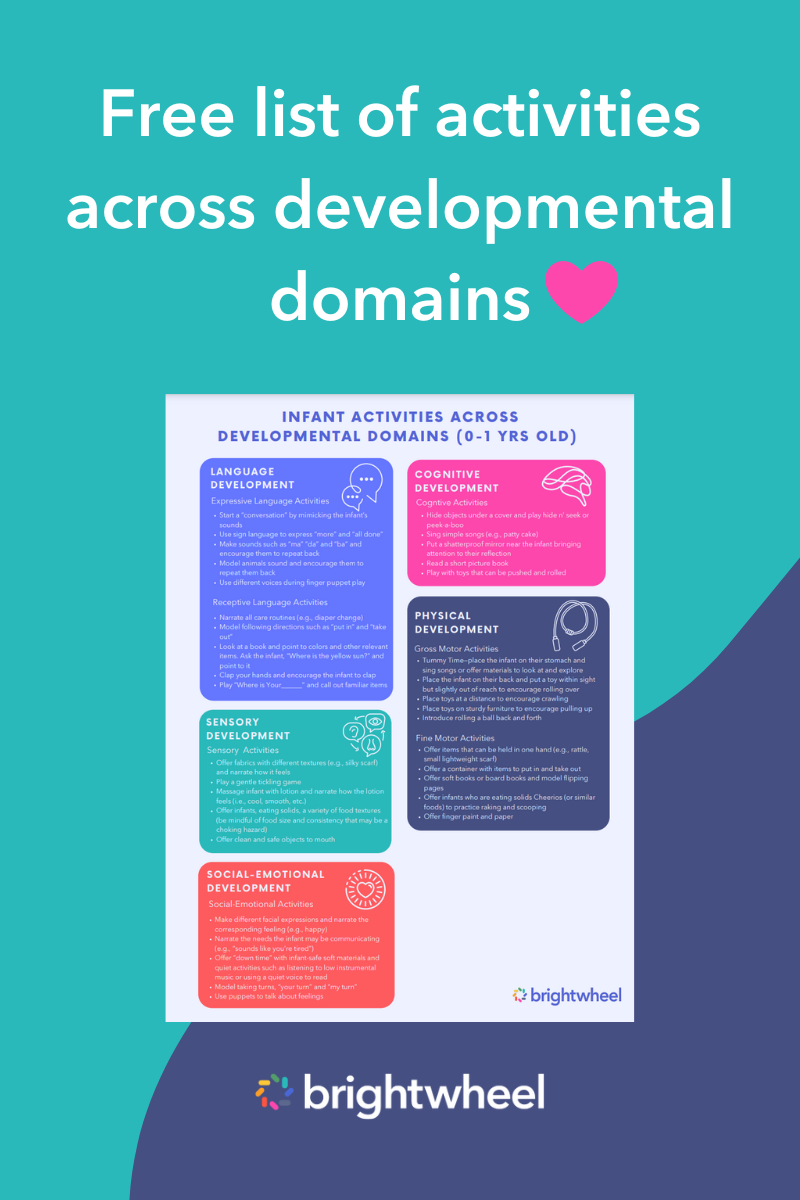
Developmental delays in children are fairly common and can be a result of a myriad of factors. The most common ones are genetics, parental behaviors during pregnancy, birth complications, infections during and after birth, and exposure to environmental toxins.
Knowledge of developmental delays is critical for all childcare providers. This way, they can learn how to identify developmental delays and know what to do after observing signs of delay. We’ve put together this comprehensive guide to help childcare providers looking to acquire knowledge on developmental delays in children.
What is developmental delay?
According to the Centers for Disease Control and Prevention (CDC), approximately one in six children in the U.S. have one or more developmental disability or other developmental delay. Developmental delay is when a child doesn’t meet the developmentally appropriate milestones compared to their peers. Depending on the severity, developmental delays can be mild, moderate, or severe. The delays can affect one or more child developmental domains like cognitive, physical, and social-emotional.
Causes of developmental delays
Delays in development may result from various causes, which fall into four categories. These are prenatal, perinatal, postnatal, and other causes.
- Prenatal refers to the period before birth. The common prenatal developmental delays in children include genetic disorders, cerebral dysgenesis, vascular, drugs, toxins, and maternal infections.
- Perinatal refers to the time of birth. Perinatal developmental delays in children include perinatal asphyxia, prematurity, intrauterine growth retardation, intraventricular hemorrhage, and symptomatic hypoglycemia.
- Postnatal refers to the period after birth. The typical developmental delays around this time are infections like meningitis, metabolic causes like hyponatremia and dehydration, and childhood traumas.
- Other causes of developmental delays in children may include malnutrition, maternal health disorder, maltreatment, and severe underestimation.
Developmental delays in children
All children are unique and achieve developmental milestones at different times. However, delays in development can cause some children to fall behind. One of the best ways to know if a child has developmental delays is by observing the signs.
Signs and symptoms of developmental delays in children vary depending on the type. Below are the different developmental delays in children based on developmental domains.
Cognitive delays
Cognitive development refers to how children think, explore, and solve problems. Cognitive delays affect a child’s brain development and the ability to acquire knowledge and skills. It can also cause difficulties in learning and understanding, which manifest when children join preschool.
The primary causes of cognitive delays in children include:
- Genetic disorders like down syndrome
- Prenatal injuries
- Children’s inability to develop properly in the womb
- Perinatal defects like inadequate oxygen or hemorrhage
- Malnutrition, meningitis, whooping cough, and exposure to toxins like lead and mercury
Below are the signs childcare providers should be on the lookout for to know if a child has cognitive delays.
- Delays in sitting, speech, crawling, or walking
- Low attention span
- Having difficulty solving simple problems or completing simple tasks like building tower blocks
- Infantile behavior
- Inability to use gestures, wave, or follow instructions
- Having difficulty imitating actions or words
- Incapacity to distinguish the functions of common objects such as a toothbrush and spoon
Possible treatment options include play therapy, occupational therapy, speech therapy, and behavioral therapy.
Gross motor delays
Gross motor development is a child’s ability to use large muscles in the arms, legs, and torso. Gross motor skills cause movements such as crawling, rolling, walking, jumping, and running. Delays in motor skills development refer to a child’s ability to coordinate or use the large muscle groups in the core, arms, and legs.
The possible causes of gross motor delays in children include:
- Genetic disorders like muscular dystrophy
- Perinatal defects like hemorrhage and prolonged labor
- Cognitive delays
- Muscles disease like myopathy
- Vision impairment
Below are the signs of gross motor delays you should be on the lookout for:
- Trouble controlling the head and neck
- Inability to roll over, crawl, walk, or run
- Stiff muscles
- Improper body posture
- Experiencing difficulty in climbing up and down the stairs
- Inability to stand when supported
Gross motor delay treatment options include physical therapy, occupational therapy, and play-based physical activities like jumping on a trampoline.
Speech delays
Language development refers to the cognitive process of hearing and using sounds to communicate and forms the foundation for early childhood literacy. Language and speech delays are the most common types of developmental delays in children. Language and speech delays may be characterized by a child’s inability to put two words together or difficulty verbally expressing words.
The possible causes of speech delays in children include:
- Oral motor issues like weak mouth muscles
- Tongue and jaw movement problems
- Cerebral palsy
- Hearing impairment
- Genetic disorders like autism spectrum disorders
- Lack of stimulation
- Being in a bilingual home
Below are the signs of speech delays in a child you should be on the lookout for:
- No response to sound or loud noises
- No babbling
- Doesn't imitate sounds
- Doesn't use any single words, e.g., “papa”
- Doesn't comprehend words like “bye” and “no”
- Can’t speak at least 15 words by age two
- Inability to use two-word phrases without repetition
- Inability to express thoughts
Some of the best ways to treat speech delays are increasing communication frequency, reading to the child, and speech therapy.
Social and emotional delays
Social-emotional development refers to a child's ability to experience, express, and manage emotions and establish positive and rewarding relationships. Children experiencing social and emotional delays struggle to express and manage emotions and establish relationships with their peers and adults.
Common causes of social-emotional delays in children include:
- Parental neglect
- Cognitive delays
- Anxiety disorders
- Neurobehavioral disorders, e.g., autism spectrum disorder and attention deficit hyperactivity disorder
Below are signs of social-emotional delays in a child:
- Doesn’t smile at people
- Frightened by new faces
- Doesn’t pay attention to new faces
- Doesn’t show affection for parents and peers
- Doesn’t laugh or squeal
- No interest in peek-a-boo games
- Difficult to comfort at night
- Fears eye contact
Possible treatment options for social-emotional delays include behavioral therapy, play therapy, attachment therapy like counseling for children, and skill-oriented therapy.
Developmental screening
Childcare providers, families, and other caregivers should regularly observe and monitor children’s overall growth and progress towards typical developmental milestones including language, movement, behavior, cognition, and emotions.
Resources like the Ages and Stages Questionnaire® (ASQ) can be used by families and childcare providers to detect any developmental delays. Questionnaires and checklists like the ASQ are great ways to monitor children’s behaviors and spot any concerns early.
A more formal developmental screening goes a bit deeper than observing and monitoring a child’s progress toward developmental milestones. A developmental screening is typically done by a doctor, nurse, or other trained professional in healthcare or early childhood education. It involves questionnaires and checklists about a child’s development to determine if they are on track to meet developmental milestones or if they need additional evaluation.
The American Academy of Pediatrics (AAP) recommends routine developmental screening for children at 9, 18, 24, and 30 months of age. Screening should also be done whenever a parent, guardian, caregiver, or childcare provider has a concern about a child’s progress. The earlier a potential delay is identified, the earlier a child can get referred for more in depth evaluations, and additional support and services.
Final thoughts
Developmental delays affect children’s normal growth and development. Collaboration between teachers and families is one way to detect delays in child development early. Preschool teachers can regularly track children’s developmental milestones and communicate any concerns with families in a caring, supportive and respectful manner. With regular tracking and observation of key milestones, and regular developmental screening, any delays can be caught early and acted upon.

